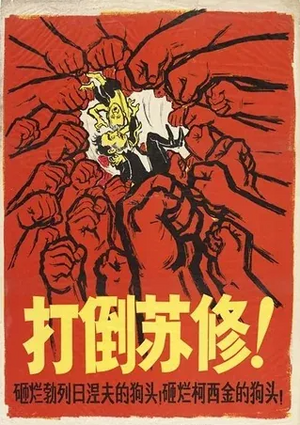Soviet revisionism: Difference between revisions
(Created article.) |
Saula Wenger (talk | contribs) mNo edit summary |
||
| (14 intermediate revisions by 3 users not shown) | |||
| Line 1: | Line 1: | ||
Soviet revisionism was a successful movement of the Soviet bourgeoisie to restore capitalism in the [[Union of Soviet Socialist Republics| | [[File:Downwithsovietrevisionism.png|right|thumb|[[People's Republic of China|Chinese]] [[anti-revisionism|anti-revisionist]] poster which says "Down with Soviet revisionism! Smash [[Brezhnev|Brezhnev's]] dog's head to pulp! Smash [[Kosygin|Kosygin's]] dog's head to pulp!"]] | ||
'''Soviet revisionism''' was a successful movement of the [[New bourgeoisie|revived]] Soviet [[bourgeoisie]] to [[Restoration of capitalism in the Soviet Union|restore]] [[capitalism]] in the [[Union of Soviet Socialist Republics|Soviet Union]], which disguised itself as [[communism|communist]]. The turning of the USSR into a revisionist state was put in place upon [[Death of Joseph Stalin|Stalin's death]], in 1953. At that point, [[Nikita Khrushchev]] took power and started tearing away at the foundations of [[Marxism–Leninism]] while letting criminals run free and [[On The Cult of Personality and Its Consequences|defaming Stalin]]. At first he started with the [[intensification of class struggle under socialism]], saying that [[class struggle]] had ended and that the Soviet Union was now an "all-people's state" instead of a [[dictatorship of the proletariat]] and other policies associated with his trend of revisionism, [[Khrushchevism]]. It is known to Marxists worldwide that the [[state]] exists only as a weapon of one class against another. | |||
The next revisionist premier, [[Leonid Brezhnev]], continued the plan with market reforms known as [[perestroika]] and a movement to allow counter-revolutionaries to openly spread | The next revisionist premier, [[Leonid Brezhnev]], continued the plan with market reforms and implemented even more explicit [[Social-imperialism|social-imperialist]] policies. [[Mikhail Gorbachev|Gorbachev]], finally, implemented policies known as [[perestroika]] and a movement to allow counter-revolutionaries to openly spread bourgeois propaganda called [[glasnost]]. However, glasnost was not particularly crucial, considering bourgeois propaganda was already being disseminated from the Communist Party itself, which at had openly admitted to not being a dictatorship of the proletariat long before this. | ||
Finally, | Finally, in the period of 1989–1991, Gorbachev illegalized the Communist Party, empowered [[right-wing]] counter-revolutionaries, and oversaw the official [[dissolution of the Soviet Union]]. | ||
== Parties that support Soviet | == Parties that support Soviet revisionism == | ||
* [[Communist Party of Cuba]] | * [[Communist Party of Cuba]] | ||
* [[Communist Party of Vietnam]] | * [[Communist Party of Vietnam]] | ||
* [[Armenian Communist Party]] | * [[Armenian Communist Party]] | ||
* [[Communist Party USA]] | * [[Communist Party USA]] | ||
* [[Party of Communists USA]] | |||
* [[Party for Socialism and Liberation]] | * [[Party for Socialism and Liberation]] | ||
== See also == | |||
* [[Soviet social-imperialism]] | |||
* [[Restoration of capitalism in the Soviet Union]] | |||
* [[Chinese revisionism]] | |||
[[Category:Revisionism]][[Category:Union of Soviet Socialist Republics]] | |||
Latest revision as of 22:53, 11 December 2025

Soviet revisionism was a successful movement of the revived Soviet bourgeoisie to restore capitalism in the Soviet Union, which disguised itself as communist. The turning of the USSR into a revisionist state was put in place upon Stalin's death, in 1953. At that point, Nikita Khrushchev took power and started tearing away at the foundations of Marxism–Leninism while letting criminals run free and defaming Stalin. At first he started with the intensification of class struggle under socialism, saying that class struggle had ended and that the Soviet Union was now an "all-people's state" instead of a dictatorship of the proletariat and other policies associated with his trend of revisionism, Khrushchevism. It is known to Marxists worldwide that the state exists only as a weapon of one class against another.
The next revisionist premier, Leonid Brezhnev, continued the plan with market reforms and implemented even more explicit social-imperialist policies. Gorbachev, finally, implemented policies known as perestroika and a movement to allow counter-revolutionaries to openly spread bourgeois propaganda called glasnost. However, glasnost was not particularly crucial, considering bourgeois propaganda was already being disseminated from the Communist Party itself, which at had openly admitted to not being a dictatorship of the proletariat long before this.
Finally, in the period of 1989–1991, Gorbachev illegalized the Communist Party, empowered right-wing counter-revolutionaries, and oversaw the official dissolution of the Soviet Union.
Parties that support Soviet revisionism
- Communist Party of Cuba
- Communist Party of Vietnam
- Armenian Communist Party
- Communist Party USA
- Party of Communists USA
- Party for Socialism and Liberation